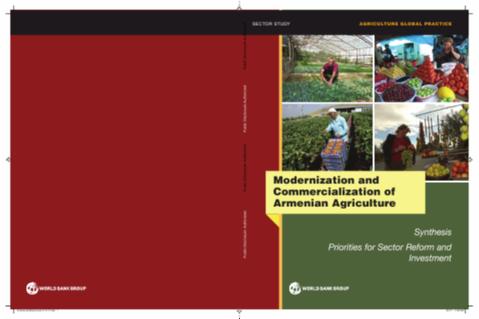The World Bank is a vital source of financial and technical assistance to developing countries around the world. We are not a bank in the ordinary sense but a unique partnership to reduce poverty and support development. The World Bank Group has two ambitious goals: End extreme poverty within a generation and boost shared prosperity.
- To end extreme poverty, the Bank's goal is to decrease the percentage of people living on less than $1.25 a day to no more than 3% by 2030.
- To promote shared prosperity, the goal is to promote income growth of the bottom 40% of the population in each country.
The World Bank Group comprises five institutions managed by their member countries.
The World Bank Group and Land: Working to protect the rights of existing land users and to help secure benefits for smallholder farmers
The World Bank (IBRD and IDA) interacts primarily with governments to increase agricultural productivity, strengthen land tenure policies and improve land governance. More than 90% of the World Bank’s agriculture portfolio focuses on the productivity and access to markets by small holder farmers. Ten percent of our projects focus on the governance of land tenure.
Similarly, investments by the International Finance Corporation (IFC), the World Bank Group’s private sector arm, including those in larger scale enterprises, overwhelmingly support smallholder farmers through improved access to finance, inputs and markets, and as direct suppliers. IFC invests in environmentally and socially sustainable private enterprises in all parts of the value chain (inputs such as irrigation and fertilizers, primary production, processing, transport and storage, traders, and risk management facilities including weather/crop insurance, warehouse financing, etc
For more information, visit the World Bank Group and land and food security (https://www.worldbank.org/en/topic/agriculture/brief/land-and-food-security1
Resources
Displaying 306 - 310 of 4906The Role of Inequality in Climate-Poverty Debates
There is no doubt that the poorest
people are already and will continue to be most severely
impacted by climatic changes, including shifting trends as
well as more frequent and severe extreme events. Yet, new
insights on the dynamics and distribution of poverty point
to the need to comprehend where the poor and poorest are,
how they are poor, and why their poverty constrains their
abilities to cope with and adapt to occurring and predicted
The Impact of a Community Development and Poverty Reduction Program on Early Childhood Development in Morocco
Participatory community development
programs are designed to match government investments with
local needs. In Morocco, where issues of inequality and
poverty are high on the national agenda, a community
development program, the National Initiative for Human
Development, targeted high-poverty areas for additional
investments. This paper examines whether, in addition to
reducing poverty, such programs can also promote human
Growth Poles
This report looks at the growth poles
policy in Romania to determine ways to increase its
effectiveness and efficiency for the next programming cycle
(2014-2020). The growth poles policy in Romania has been
initiated in 2008, as a means to support a balanced economic
development of the country, while still targeting
investments to maximize economic impact. A total of seven
growth poles have been designated and are currently
Strategic IDPs Assessement
Integrated Development Plans (IDPs) have
been introduced in Romania as a prerequisite for accessing
EU funds under the Regional Operational Program (ROP). The
IDPs designed for growth poles represent a specific category
of strategic planning documents as: 1) they need to be
considered within the frame of the national policy to whose
implementation they contribute; and 2) they represent a
first endeavor to think of development across functional
Modernization and Commercialization of Armenian Agriculture
The study focuses on themes and areas that have been identified as highly relevant for the modernization and commercialization of the agriculture sector. The study originally aimed to review: agricultural marketing, processing and exports; food safety; agricultural “cooperation,” including farmers’ groups; agricultural extension and agricultural insurance.







